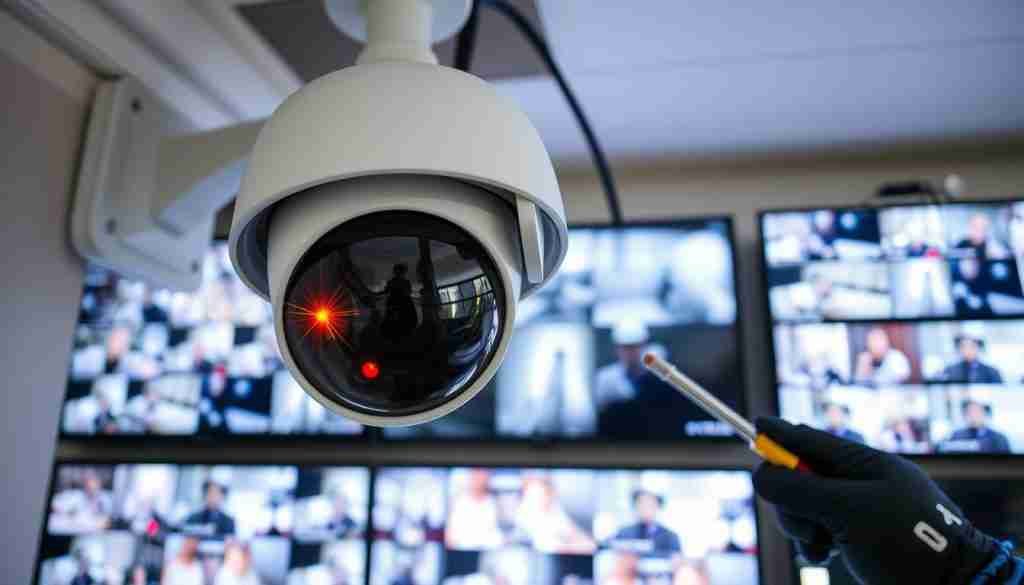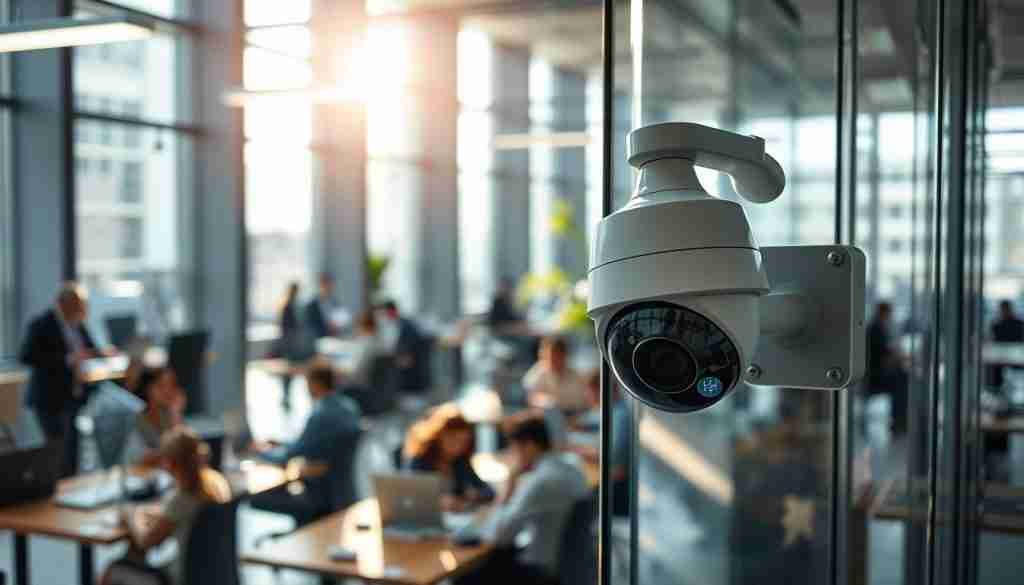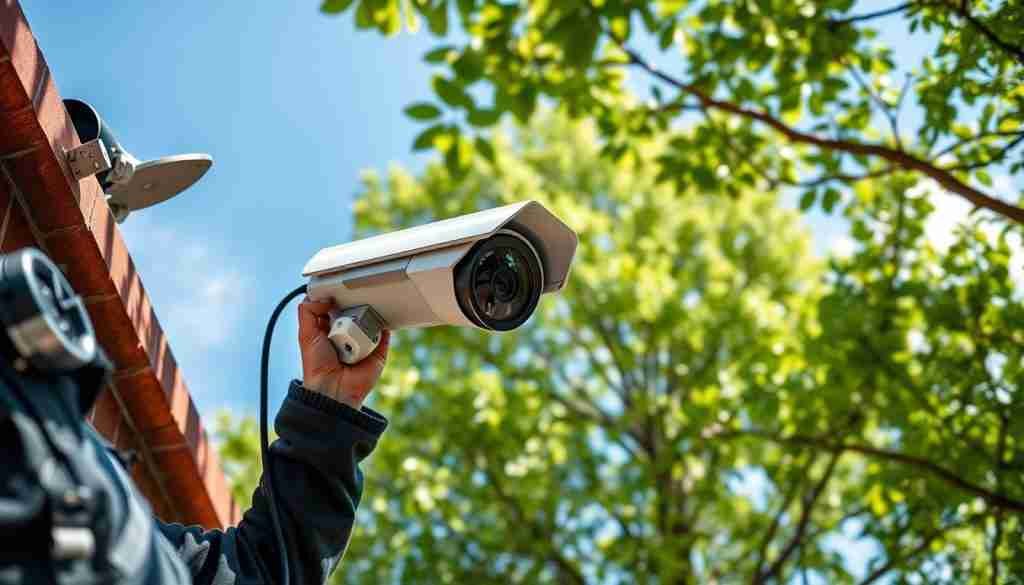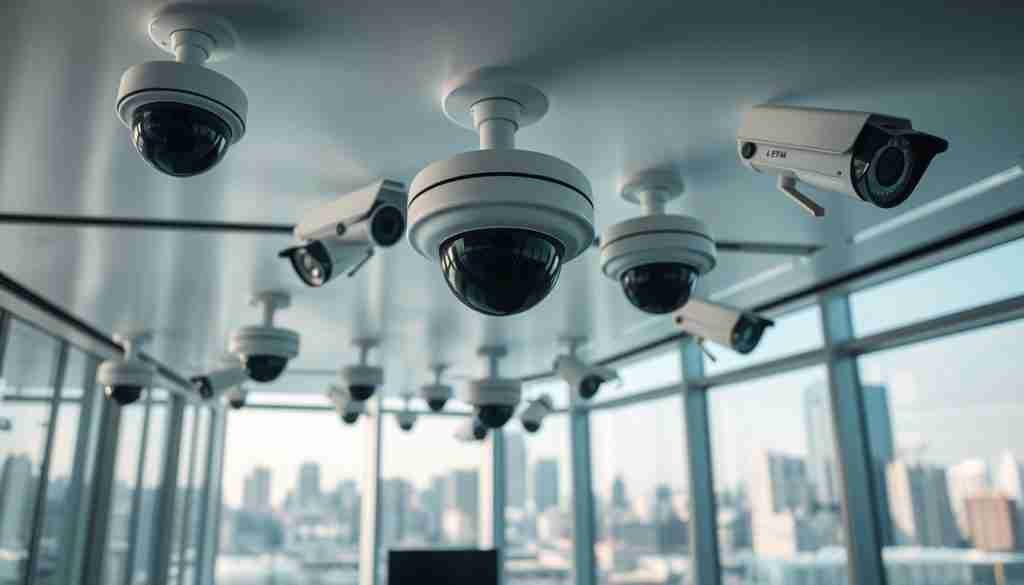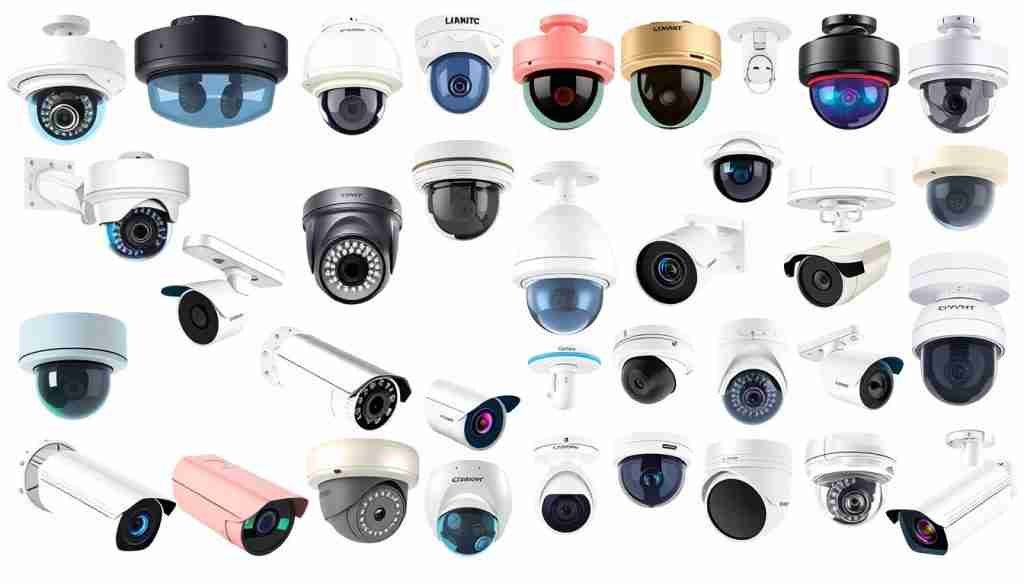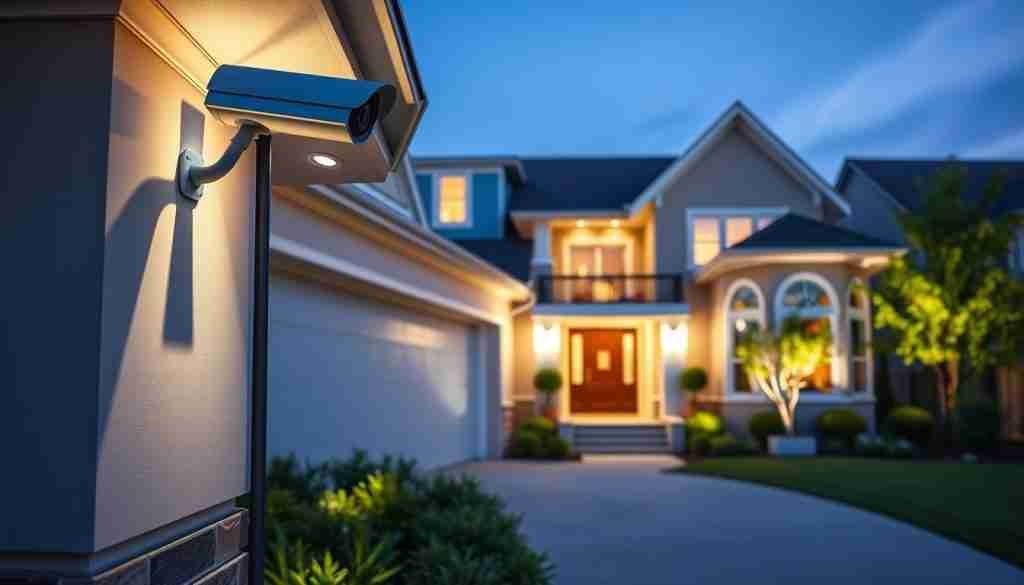Ever wondered why your CCTV security cameras might have video quality issues or connectivity problems? As a homeowner or business owner, it’s key to keep your surveillance system working well. This is important for protecting your property and loved ones. But, if you’re not sure how to fix these camera problems, don’t worry. Our expert guide will help you understand common CCTV challenges and offer practical solutions to keep your system running smoothly.
Key Takeaways
- Discover the most common CCTV camera issues, including video quality, network connectivity, and power supply failures.
- Learn essential components of a reliable CCTV system for optimal performance.
- Uncover the causes and fixes for poor image and video quality, from lens focusing to lighting and resolution settings.
- Explore network and connectivity troubleshooting tips to maintain seamless surveillance.
- Understand power-related problems and their solutions, including voltage fluctuations and battery backup issues.
Understanding Common CCTV Camera Problems and Solutions
Running a reliable CCTV system means knowing the common issues you might face. Problems like video quality issues, network connectivity problems, and power supply failures can affect your system’s performance. Luckily, with the right troubleshooting, you can often fix these problems and keep your system running smoothly.
Video Quality Issues
One common problem is a drop in video quality. This can show up as blurry, pixelated, or distorted images. Issues like lens problems, wrong lighting, and low resolution can cause this. Fixing these problems can help you get back to high-quality video from your cameras.
Network Connectivity Problems
CCTV systems need a strong network to work well. But, problems like intermittent connections or outages can happen. To fix these cctv system troubleshooting issues, check your cables, network settings, and devices.
Power Supply Failures
A steady power supply is key for your CCTV cameras to work without pause. Issues like voltage problems, battery issues, and wiring faults can cause camera malfunctions. Fixing these power problems ensures your system gets the power it needs.
Knowing and fixing these common CCTV camera problems is crucial for a reliable surveillance system. By being proactive with troubleshooting and maintenance, you can reduce downtime and keep your system in top shape.
Essential Components of a Reliable CCTV System
Creating a strong cctv maintenance plan means knowing the key parts of a good CCTV system. These parts include top-notch surveillance footage quality and smooth connections. Each part is vital for the system’s reliability and success over time.
At the core of any CCTV system are the cameras. Choosing the best cameras with features like night vision and high resolution is key. Also, the recording devices, like DVRs or NVRs, are crucial for saving and reviewing footage.
Storage solutions are also essential. You can choose from on-site hard drives or cloud storage. It’s important to have enough and safe storage for all your surveillance footage. The monitoring tools, such as displays and controls, should be easy to use for everyone.
- High-quality cameras with advanced features
- Reliable recording devices (DVRs or NVRs)
- Ample and secure storage solutions
- Intuitive monitoring equipment and control interfaces
Knowing the main parts of a reliable CCTV system helps you make better choices. This ensures your surveillance system works well and meets your needs.
Poor Image and Video Quality: Causes and Fixes
High-quality surveillance footage is key for good security monitoring. But, CCTV systems can face issues with poor image and video quality. This can make it hard to spot threats or capture important evidence. We’ll look at why this happens and how to fix it.
Lens Focusing Problems
Blurry or out-of-focus footage often comes from lens focusing issues. The camera’s autofocus can get off track over time. To fix this, regularly check and adjust the lens focus. This keeps your surveillance footage quality sharp and clear.
Lighting and Exposure Issues
Good lighting is vital for quality video. Bad or uneven lighting can make footage hard to see. Adjust your camera’s exposure to get the lighting right. You might also need extra lighting to keep your camera malfunctions at bay.
Resolution Settings
- Make sure your CCTV cameras are set to the highest resolution for detailed footage.
- Remember, higher resolutions use more storage and bandwidth. Find a balance between quality and system needs.
- Check and adjust your resolution settings often to keep your surveillance footage quality top-notch.
Fixing these common problems can greatly improve your CCTV system’s image and video quality. This ensures your security monitoring works well. Regular maintenance and adjustments help avoid camera malfunctions and keep your footage quality high.
Network and Connectivity Troubleshooting Guide
Keeping your CCTV system running smoothly is key for your property’s security. But, network and connectivity issues can cause problems. This guide will help you fix common camera connectivity problems and keep your CCTV system efficient.
Addressing IP Camera Setup Challenges
Setting up IP cameras can be tricky, especially with many devices. To make it easier, follow these steps:
- Set up your network settings right, including IP addresses and DNS servers.
- Make sure your cameras work well with your network.
- Check if firewalls or routers are blocking your cameras.
Mitigating Wireless Signal Interference
Wireless CCTV systems can face signal issues. Here’s how to fix it:
- Find and remove things that might mess with your signal, like other devices or walls.
- Place your wireless cameras and access points for the best signal.
- Think about using a stronger wireless protocol, like Wi-Fi 6, for better performance.
Network Configuration Tips
Getting your network right is crucial for CCTV system troubleshooting. Here are some tips:
| Setting | Recommendation |
|---|---|
| IP Addressing | Give your cameras static IP addresses for steady connection. |
| Bandwidth Management | Make sure you have enough bandwidth for your camera’s video quality. |
| Quality of Service (QoS) | Use QoS to make sure CCTV traffic gets priority and is smooth. |
By tackling these camera connectivity problems and following these tips, you can keep your surveillance network running well. This ensures a safe environment for everyone.
Power-Related Issues and Their Solutions
Keeping your CCTV system running smoothly means tackling power problems. Issues like voltage changes, battery failures, and wiring issues can stop your system. We’ll look at ways to keep your surveillance system up and running.
Voltage Fluctuations
Voltage changes can mess up your CCTV cameras and recorders, causing video recording failures. To fix this, use voltage regulators or surge protectors. Also, check your system’s voltage often and fix any problems quickly to keep it working right.
Battery Backup Problems
When the power goes out, your CCTV system can stop working. A good battery backup is key. Make sure to check and replace your backup batteries regularly. Watch the charge levels and swap out any bad batteries to avoid failures.
Wiring Issues
Bad wiring or damaged cables can mess up your system’s power and data. Check all connections often and replace any bad wiring. Use weatherproof and shielded cables to protect against damage from the environment and interference.
| Power-Related Issue | Potential Impact | Solution |
|---|---|---|
| Voltage Fluctuations | Camera and recorder malfunctions, video recording failures | Install voltage regulators or surge protectors |
| Battery Backup Problems | System downtime during power outages | Maintain and replace backup batteries as needed |
| Wiring Issues | Power and data disruptions, potential system failures | Regularly inspect and replace damaged cables |
Fixing power problems early on helps your CCTV system run smoothly. This means less downtime and better video quality. Regular cctv maintenance and watching your system’s power are crucial for good surveillance and security.
Storage and Recording Problems
Keeping your CCTV system running smoothly is more than just setting up cameras. It also means your video recording and storage must work well. Many users face issues like not enough storage, damaged video files, and problems with DVR/NVR systems. These can mess up your surveillance footage.
Video recording failures are a big problem. They can be caused by hard drive failures, software bugs, or power outages. To avoid this, check your CCTV system’s storage often. Make sure you have enough space for the footage you need to keep.
Another common issue is CCTV system troubleshooting for network problems. If your cameras don’t connect right with your recording device, you might see gaps or bad video. Keep your system’s software and firmware updated. Also, make sure your network is stable to fix these issues.
| Common Storage and Recording Issues | Potential Solutions |
|---|---|
| Insufficient storage space | Upgrade hard drive capacity, implement video compression, or utilize cloud storage |
| Corrupted video files | Regularly check and maintain file integrity, use reliable storage media |
| DVR/NVR malfunctions | Ensure proper power supply, update firmware, and perform regular maintenance |
Understanding and fixing these common problems can keep your CCTV system working well. It will capture clear, reliable footage for security and surveillance. Regular checks and maintenance are essential for a strong video recording system.
Physical Camera Maintenance and Care
Keeping your CCTV cameras in top shape is key for their long-term performance. Regular care and maintenance can prevent camera malfunctions. This ensures your surveillance system works smoothly. We’ll cover essential cleaning, weatherproofing, and hardware checks to make cctv maintenance easy.
Cleaning Procedures
Dirt, dust, and grime can quickly build up on your CCTV camera lenses. This can harm image quality and system performance. To keep your cameras clean and clear, follow these steps:
- Use a soft, lint-free cloth to gently wipe the camera lens, being careful not to apply too much pressure.
- For more stubborn dirt or smudges, use a specialized camera lens cleaning solution and a microfiber cloth to safely remove any residues.
- Avoid using household cleaners or paper towels, as they can scratch or damage the delicate lens surface.
Weather Protection
CCTV cameras outside face many weather challenges like rain, snow, and extreme temperatures. Good weatherproofing can protect your cameras and keep them running:
- Install weatherproof housings or enclosures to shield the cameras from the elements.
- Inspect and replace any worn or damaged seals and gaskets to maintain the integrity of the housing.
- Consider using protective coatings or anti-fog treatments to prevent lens condensation and fogging.
Hardware Inspection
Regular visual checks of your CCTV camera hardware can spot issues early. Look closely at these areas during inspections:
| Component | Inspection Points |
|---|---|
| Camera Housing | Check for cracks, damage, or signs of weathering. |
| Mounting Brackets | Ensure secure and stable attachment to the mounting surface. |
| Cables and Connections | Inspect for wear, fraying, or loose connections. |
By following these cctv maintenance tips, you can make your CCTV cameras last longer. This keeps your surveillance system reliable and effective.
Advanced Security Camera Installation Tips
Proper CCTV camera installation is key for good security monitoring. It helps avoid common cctv installation challenges and security monitoring issues. Advanced techniques can improve your surveillance and prevent future problems.
Camera placement is very important. The right spot can make your cameras capture clear, quality footage. Don’t place cameras in direct sunlight or near bright lights, as this can harm image quality.
- Think about camera angles and heights to cover the area well.
- Choose vandal-resistant mounts and housings to protect your cameras.
- Make sure cables are managed and weatherproofed to avoid damage or interference.
Integrating your CCTV cameras with other security devices is also crucial. This can make your surveillance system much more effective.
| Installation Consideration | Best Practice |
|---|---|
| Camera Placement | Place cameras to avoid glare or blind spots. |
| Weatherproofing | Use weatherproof housings and manage cables well. |
| System Integration | Connect your CCTV cameras with other security devices. |
Using these advanced installation tips can help you solve cctv installation challenges and security monitoring issues. This ensures a reliable and effective security system.
Choosing the Right CCTV Camera for Your Needs
Choosing the right CCTV camera is key to solving cctv camera problems. There are many types, like dome, box, hidden, and IP networking cameras. Knowing what each can do helps you pick the best one for your needs.
Think about how you’ll use the camera. For big areas, a PTZ (Pan-Tilt-Zoom) camera is great. It lets you control the camera’s view remotely. For sneaky monitoring, a hidden camera is perfect.
Also, consider the lighting where you’ll use the camera. For dark places, an IR (Infrared) Night Vision camera works well. But, if it’s always bright, a simple Dome or Box camera will do.
Choosing the right camera means looking at your security needs, the area, and the quality you want. By thinking about these, you can find the best camera for your property’s security.
| Camera Type | Key Features | Best Suited For |
|---|---|---|
| Dome Camera | Discreet, vandal-resistant, indoor/outdoor use | General surveillance, public areas |
| Box Camera | Customizable, high-resolution, professional use | Detailed monitoring, commercial/industrial settings |
| Hidden Camera | Concealed design, covert surveillance | Discreet monitoring, sensitive areas |
| IP Networking Camera | Remote access, cloud-based storage, advanced features | Modern, technologically-driven surveillance |
| IR Night Vision Camera | Low-light performance, infrared illumination | Nighttime monitoring, low-light environments |
| PTZ Camera | Pan-tilt-zoom capabilities, remote control | Monitoring large areas, flexible surveillance |
Knowing what each CCTV camera can do helps you choose wisely. This way, you can improve your surveillance footage quality and property security.
The Benefits of Professional Fort Worth CCTV Installation and Maintenance
Professional installation and regular maintenance are key for a reliable CCTV system. Experts like Fort Worth Security Cameras offer many benefits that DIY setups can’t match.
Professional cctv installation prevents common problems. Techs know how to set up cameras right, ensuring they work well with your security network. This avoids issues like poor video quality and network problems.
- Proper camera positioning and adjustment for optimal coverage and image quality
- Expertise in selecting the right camera models and accessories for your specific needs
- Efficient integration with your existing security infrastructure and network
Regular cctv maintenance by pros keeps your system running smoothly. They do inspections, updates, and fix problems early. This keeps your cameras working great.
| Maintenance Task | Benefits |
|---|---|
| Camera cleaning and lens maintenance | Preserves image quality and prevents dust/debris buildup |
| Hardware inspection and upgrades | Extends the lifespan of components and ensures compatibility with the latest technologies |
| Software updates and configurations | Keeps your system secure and optimized for performance |
Professional cctv installation and cctv maintenance cost more upfront. But, the long-term benefits are worth it. Protect your investment and keep your CCTV system reliable and effective with a trusted expert.
Conclusion
In this detailed guide, we’ve looked at common CCTV camera issues and how to fix them. We’ve covered video quality problems, network issues, and power failures. You now know how to keep your security monitoring system working well.
To keep your CCTV cameras running smoothly, focus on image quality, network issues, and power. Use the troubleshooting tips and best practices from this article. This will help you maintain your system and protect your property from security threats.
Don’t forget, regular maintenance and expert help are key to a good CCTV system. With the knowledge from this guide, you can handle CCTV problems and keep your surveillance system reliable. It’s a crucial part of your security setup.
FAQ
What are the most common CCTV camera problems and how can they be addressed?
Common CCTV camera issues include poor video quality, network problems, and power failures. To fix these, check the lens focus, lighting, and resolution. Also, ensure IP camera setup is correct and avoid wireless signal interference.
Stable voltage and proper wiring are key. Regular maintenance and professional installation can prevent and solve many problems.
How can I ensure my CCTV system delivers reliable, high-quality surveillance footage?
For top-notch surveillance, focus on lens, lighting, and resolution settings. Clean and weatherproof your cameras regularly. Inspect hardware for damage.
Choosing the right camera and working with pros can boost your system’s performance. This ensures reliable footage.
What are the essential components of a dependable Fort Worth CCTV system, and how can I ensure they function properly?
A good CCTV system needs cameras, recorders, storage, and monitors. Ensure these work well by fixing network, power, and storage issues. Regular checks and professional help are vital.
How can I troubleshoot and resolve network and connectivity issues with my CCTV cameras?
To solve network and connectivity problems, focus on IP camera setup and wireless signal issues. Proper wiring and managing voltage are also crucial. This ensures your system records footage without interruption.
What are the most effective strategies for physically maintaining and caring for CCTV cameras?
For CCTV camera care, clean them regularly and protect from weather. Inspect hardware for damage. This prevents malfunctions and keeps your system running smoothly.
What are the key benefits of professional CCTV installation and maintenance?
Professional installers like Fort Worth Security Cameras offer many advantages. They ensure cameras are placed right, wiring is done well, and systems work together smoothly. Regular maintenance by pros keeps your system reliable and performing well.

